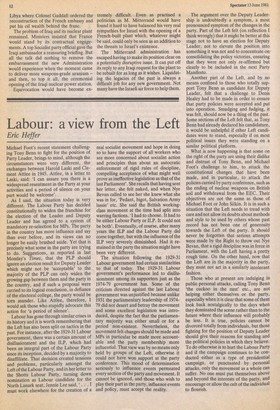Labour: a view from the Left
Eric Heifer
Michael Foot's recent statement challenging Tony Benn to fight for the position of Party Leader, brings to mind, although the circumstances were very different, the exchanges between Harold Laski and Clement Attlee in 1945. Attlee, in a letter to Laski, said: 'I can assure you there is a widespread resentment in the Party at your activities and a period of silence on your part would be welcome'.
As I said, the situation today is very different. The Labour Party has decided constitutionally to widen the franchise for the election of the Leader and Deputy Leader and has agreed to a system of mandatory re-selection for MPs. The party in the country has more influence and say than ever before, and its views can no longer be easily brushed aside. Yet that is precisely what some in the party are trying to do. Suggestions, as reported in last Monday's Times, that the PLP should ignore an election result for Deputy Leader which might not be 'acceptable' to the majority of the PLP can only widen the growing gap between them and the party in the country, and if such a proposal were carried to its logical conclusion, in defiance of the electoral college, the party would be torn asunder. Like Attlee, therefore, I would ask those who stupidly advocate this action for 'a period of silence'.
Labour has gone through similar crises in its history and it is worth remembering that the Left has also been split on tactics in the past. For instance, after the 1929-31 Labour government, there was a certain amount of disillusionment and the ILP, which had been an integral part of the Labour Party since its inception, decided by a majority to disaffiliate. That decision created tensions and problems, particularly amongst the Left of the Labour Party, and in her letter to the Shotts Labour Party, turning down nomination as Labour candidate for the North Lanark seat, Jennie Lee said,'. . . I must work elsewhere for the creation of a real socialist movement and hope in doing so to have the support of all workers who are more concerned about socialist action and principles than about an autocratic enforcement of rigid rules of discipline, compelling acceptance of what might well prove as ineffective legislation as that of the last Parliament'. She recalls that having sent her letter, she felt naked, and when Nye Bevan called to see her she knew what she was in for, 'Pedant, bigot, Salvation Army lassie' etc. She said the British workingclass movement at the time had split into warring factions. 'I had to choose. It had to be either Labour Party or IL?. It could not be both'. Eventually, of course, after many years the ILP and the Labour Party did come together, but with the influence of the ILP very severely diminished. Had it remained in the party the situation might have been very different.
The situation following the 1929-31 Labour government had certain similarities to that of today. The 1929-31 Labour government's performance led to disillusionment among its supporters just as the 1974-79 government has. Some of the criticism directed against the last Labour government was unjustified because unlike 1931 the parliamentary leadership of 197479 did not desert and betray the movement and some excellent legislation was introduced, despite the fact that the parliamentary majority was either small or for a period non-existent. Nevertheless, the movement felt changes should be made and MPs in particular be made more accountable and the party membership more influential. That view was by no means only held by groups of the Left, otherwise it could not have won support at the party conference. This mood of determination seriously to influence events permeated every section of the party and movement. It cannot be ignored, and those who wish to play their part in the party, influence events and policy, must accept the reality.






































 Previous page
Previous page